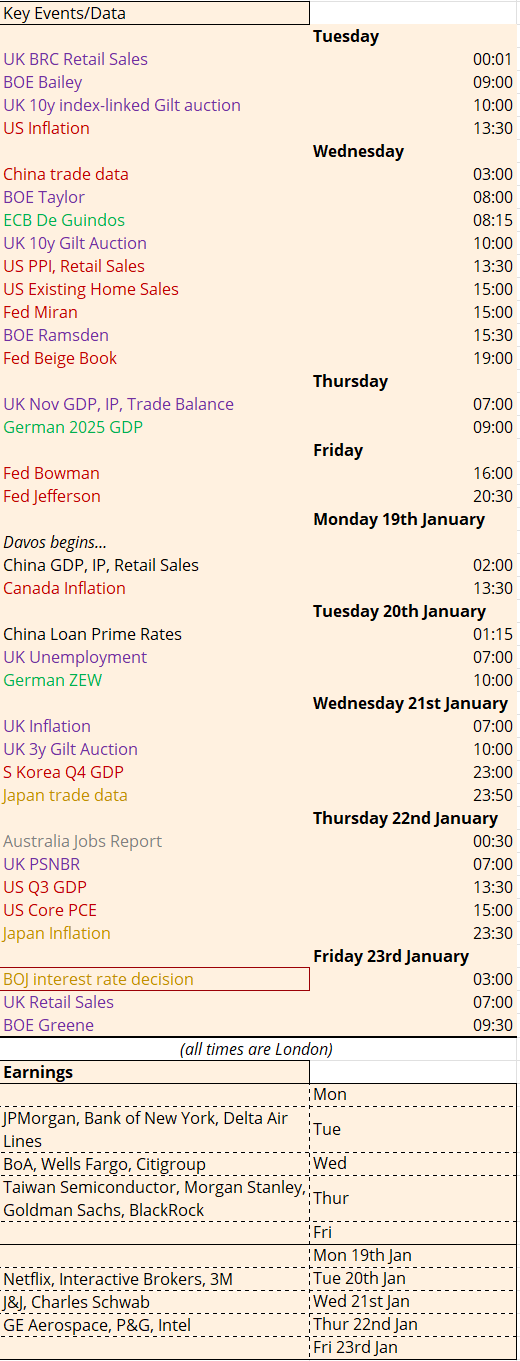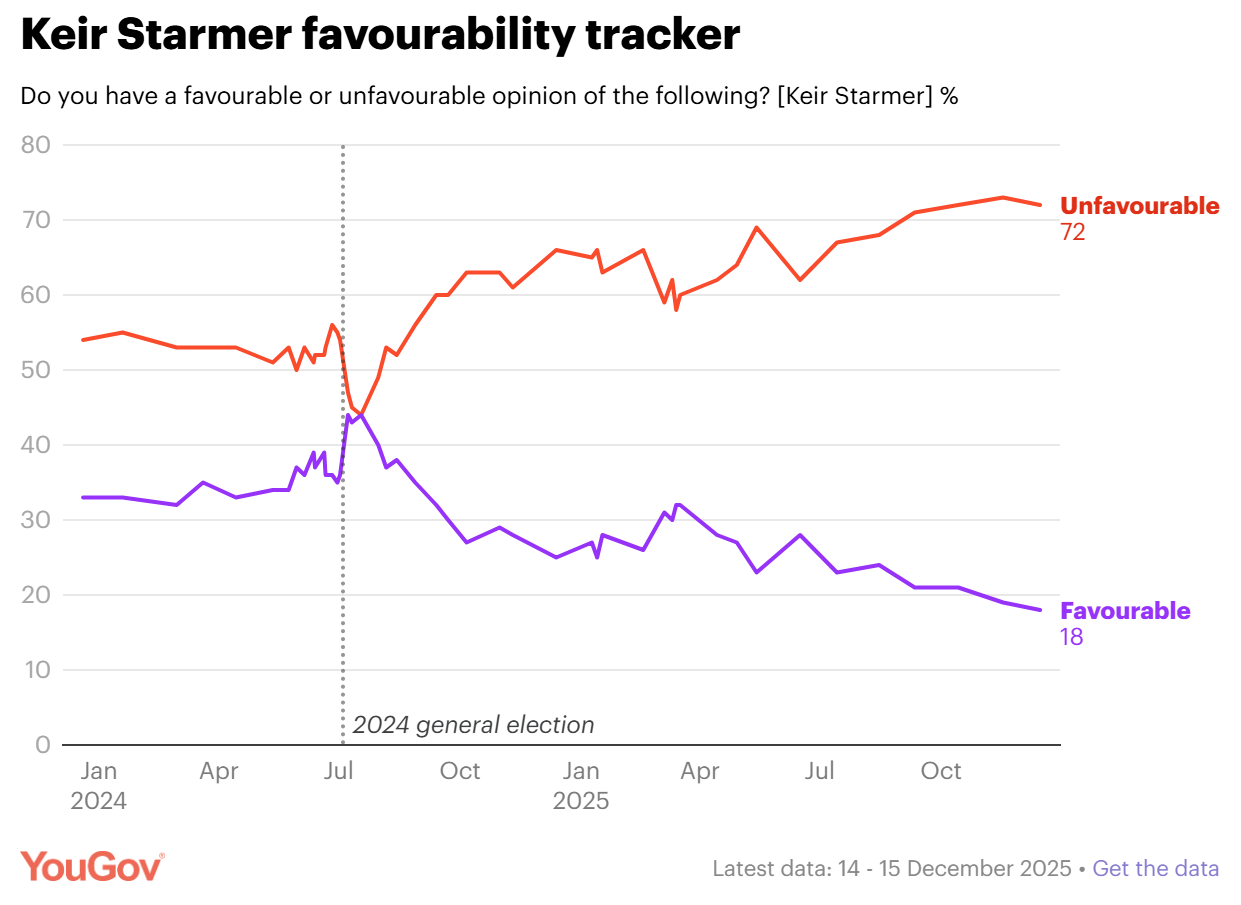
The Two Weeks That Will Be

1. France
Les jeux sont faits. France is headed for a crisis in the next two weeks, precisely because all the players in the game need the crisis. We call this the Superman power play: Clark Kent would never get elected but the hero in the cape saving the damsel in distress from the burning building wins every time. French bond spreads are going to blow out as Le Pen plays chicken with Barnier/Macron, knowing she wins either way. Either she gets a better Budget deal by delivering measures to protect the cost of living, or the government that France never voted for is forced into caretaker stalemate. Constitutional outrage is the lifeblood for the far right. If the system isn’t working for you, then why not blow up the system?
And the current set up provides the perfect opportunity to foment growing voter discontent with the establishment. A government that nobody wanted is trying to pass a budget that nobody likes. It must go – and spectacularly so. Only then can a new government emerge.
The particular circumstances in which France now finds itself are primed for revolution:
- The President, deeply unpopular, called a snap election which nobody won and then imposed an unelected establishment figure as prime minister.
- This prime minister, Michel Barnier, had to deal with horrific debt-deficit dynamics given a debt-to-GDP ratio above 112% and a budget deficit above 6% of GDP.
- He therefore proposed a tough budget of EUR 20bn of tax rises and EUR 40bn of spending cuts.
- This would have been unpalatable even if he had been elected with a mandate to deliver it. Instead, he has to rely on Le Pen’s National Rally to let such a budget pass. They would never have done so without a price to be paid.
- They demanded several red lines, one of which Barnier accepted last week, abandoning a rise in electricity tax.
- But they want him to go further:
- They want all pensions to rise in line with inflation;
- They don’t want reimbursements for certain medications to be cut;
- They don’t want taxes raised on gas;
- And they argue all of this could be paid for by reducing France’s contribution to the EU.
- If Barnier gives in, he makes explicit the implicit: that the National Rally is effectively governing France.
- And, by extension, that Le Pen is holding Brussels to ransom over the Eurozone budget rules.
- If he doesn’t, the government will fall.
- Under France’s constitution, if a budget can’t be passed then the government can force it through using Article 49.3 – unless the government is then brought down within 48 hours by a Vote of No Confidence.
- But, that doesn’t mean fresh elections:
- French constitutional rules prevent another election for 12 months after the last one.
- Instead the government will be in stasis, restricted to caretaker activities, issuing funds each month equivalent to 1/12th of the previous year’s budget.
- This effectively prevents the government from increasing spending by inflation, squeezing people just as they are demanding help with cost of living pressures.
- And then there will be the market reaction, where yields are set to rise whatever happens, potentially creating a doom loop for such a heavily indebted country:
- No agreement = no government = no action = debt-deficit mess
- Le Pen gives in = she prevents a crisis and lives to fight another day = right-wing Sword of Damocles hangs over government = higher political risk premium
- Barnier gives in = right-wing Eurosceptic government = fiscally loose
- Both sides will use the market moves to harm the other
- Barnier was on TV last week to warn of “extremely serious and turbulent conditions on financial markets” and “We need stability in order to borrow at reasonable rates”.
- Le Pen has said “All Barnier has to do is agree to negotiate” whilst her protege Jordan Bardella blamed Barnier for “Out of stubbornness and sectarianism, the government minority is therefore ending the cycle of negotiations, at the risk of provoking its censure”. RN MP Jean-Phillipe Tanguy accused Barnier of “crying wolf” as he was “forced to brandish panic”.
- There is only one winner for such a blame game – the one the public backs:
- A recent survey showed:
- 53% want the government to fall
- Two thirds of them oppose Barnier’s budget
- And 63% of them want Macron to resign if the government does fall.
- A recent survey showed:
- Barnier and Macron need to shift the narrative.
- The more Le Pen digs in, the more they hope the worsening crisis can be pinned on her.
- The problem is that they’re starting from the back foot.
- Macron thinks he is Superman but the public sees him as Lex Luthor.
- If the public blame the establishment for all of their problems, putting all the focus on the anti-establishment candidate only helps, rather than harms, their cause. Trump 2.0 being the most recent example of this.
- Time inexorably tips towards a crisis:
- Le Pen has set Monday as a deadline for Barnier over the social security financing bill element of the Budget.
- The whole Budget needs to be passed by 21 December.
There is one final card that could be played. Macron could resign. Upon calling the election he wrote an open letter where he promised ‘You can trust me to act until May 2027 as your President‘. But the very act of calling those elections was driven by a need to get ahead of the predators who were coming for him. If he resigned now, he could constitutionally return later – French presidents are only prevented from holding office for two consecutive terms. Five years from now he would still only be 51. He could even potentially portray it as an act of sacrifice for the country – and catch Le Pen on the hop. The verdict in her trial over misuse of European Parliament funds is set for 31st March. Once a French President resigns, the election is held around a month later.
One thing is clear: Eurozone sovereign risk is back.
2. The ECB
With the two core Eurozone countries of France and Germany effectively ungovernable in the face of slowing growth and disinflation, the ECB will be forced to cut rates by 50bp in their final meeting of the year on Thursday 12th December. Although headline inflation popped back above target, the services component was negative, ‘the weakest November seasonally adjusted services inflation print on record’.
The pivot towards more action has already begun. Banque de France Governor Villeroy de Galhau (who else?) couldn’t have been much clearer when he said ‘there is every reason to cut on December 12th. Optionality should remain open on the size of the cut’.
Chief Economist Philip Lane popped up with some intellectual heft for the case for pro-activity at the Bank of England Watchers Conference on 25th November to explain how the ECB uses scenarios to consider the path for monetary policy, something The Bernanke Review has recommended for the BOE. Buried in his speech was the chart below, from an exercise the ECB undertook in June:

They considered three different scenarios for rates: the “intermediate” baseline versus one where the interest rate cuts came “later” or “earlier”. In all scenarios inflation ends up below the 2% target by 2026 but – here’s the key – it does so even with the “earlier” rate cuts. So, front loading cuts doesn’t see inflation fall as quickly but it does still get to target in the end. So why not go for broke if you want to cut rates? December will see a new set of staff forecasts, providing an update to this scenario analysis.
The hawks will try to push back. Schnabel has said ‘I would warn against moving too far, that is into accommodative territory… Risks to inflation are now more balanced. But I don’t see a significant risk of an undershoot, in particular one that would warrant a response from our side’. But Schnabel doesn’t hold the power she once did. Events are moving rapidly.
The return of Trump has already seen Christine Lagarde attempt to move into the power vacuum at the top of Europe by telling the FT how the EU should deal with him: “not to retaliate, but to negotiate“. Meanwhile the President of the Bundesbank issued a joint statement with France’s Villeroy de Galhau entitled “A Common Call for a Franco-German Revival” which exhorted the need for unity between their countries which concluded slightly bizarrely with a focus on European defence spending: ‘Taking defence as a truly European task should lead to more joint procurement of armament and, relatedly, a higher common budget for defence’. The voters of France and Germany will no doubt be delighted that unelected central bankers are trying to debate defence and trade policy whilst their own governments have gone AWOL.
3. The US
Still, at least someone is trying to represent Europe whilst Trump/Musk set about revolutionising the US. We are now in an interregnum where the US data and Fed speakers are all awkwardly backward looking. Powell is now playing a purely political game where he must decide how much he wants to tie his own legacy to that of Trump. He will err on the side of being behind the curve, putting the President, rather than the Fed, in the spotlight as the primary actor in the economy. His speech on Wednesday will be a chance for him to reiterate his recent more patient stance, that ‘the economy is not sending any signals that we need to be in a hurry to lower rates’.
Trump-era nominee Christopher Waller speaks Monday on the “Economic Outlook” and will feel able to speak more freely about the impacts of Trump’s tariffs, tax cuts and trade wars. The usual bellwether ISM data on Monday and Payrolls on Friday are less relevant in the context of the economic revolution that will start on January 20th 2025.
4. The UK
The UK government had hoped to deliver its own revolution but instead keeps getting drawn into other issues, whether it’s assisted dying, mobile phone fraud or the Chancellor imprudently promising she is “not coming back with more borrowing or more taxes“. The Prime Minister will now set out “measurable milestones” for Labour’s missions for government. We will get an update on whether this is reassuring the UK consumer with BRC Retail Sales on Tuesday and BRC Consumer Confidence on Friday 13th December.
5. The BOJ
Japan’s bellwether quarterly Tankan survey is released on Thursday 12th December. BOJ dove Nakamura speaks this Thursday. The next BOJ meeting will be the week before Christmas and Governor Ueda has been suggesting the next rate hike is ‘nearing in the sense that economic data are on track’. A regime change in Japan is taking hold, as this chart of Japan 30 year yields vs China shows:

When Japan is no longer a low interest rate country, we are truly in a higher interest rate world. In this new era, debt matters.



